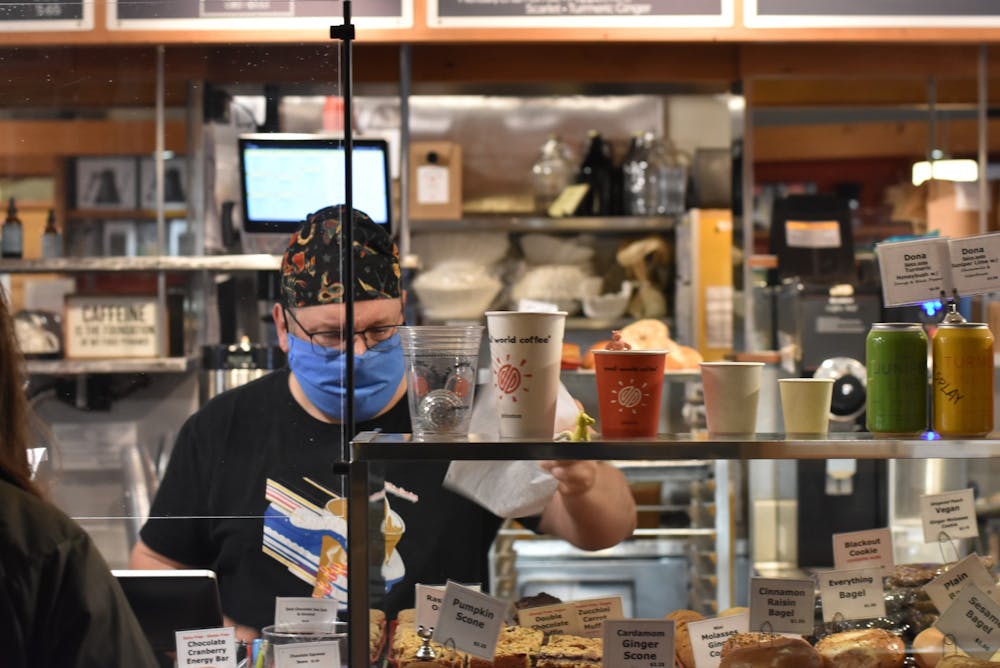The onset of the COVID-19 pandemic effectively stopped the fledgling Undergraduate Student Government (USG) Community Dining Task Force in its tracks. As students returned to campus, however, lingering pandemic conditions ultimately ensured an acceleration towards community dining goals.
As a much-debated administration-backed dining pilot progressive, the task force’s work on implementing the Pay with Points program is an example of a widely celebrated student-driven effort to build inclusivity and community through dining.
Pay with Points, a cumulation of the task force’s efforts that was unveiled at the start of the Fall 2022 semester, awards all students on the unlimited meal plan with $150 per semester to spend at various locations, including 16 off-campus eateries and a number of on-campus options such as Frist Campus Center and the U-Store.
Before the official formation of the Community Dining Task Force, interest around some sort of dining initiative with local businesses had been percolating for a while, according to current USG President Stephen Daniels ’24. During the 2019–2020 school year, prior to the start of COVID-19, former USG Senator Brad Phelps ’22, along with Sarah Elkordy ’21, proposed that the task force be created.
Phelps told The Daily Princetonian that early on, “outside of SIFP, [administrators] were a little reluctant to take on such a huge project.” SIFP stands for Scholars Institute Fellows Program, a program for first-generation and lower-income students run through the Emma Bloomberg Center for Access and Opportunity.
Shortly after the task force formed with the goal of making off-campus dining more financially accessible, the pandemic hit.
With businesses shut down and students returned to their homes to finish out the school year, community dining work halted. The following year, though, a budget surplus paved the way for the Community Dining Task Force to plow full steam ahead.
“We [USG] had this huge influx of money from COVID,” Phelps said. Because of limits on in-person activities, USG hadn’t been spending as much money as it usually would.

According to Daniels, who co-chaired the task force with Phelps in Fall 2021, a “really strong demand for community building opportunities in the wake of COVID” allowed USG to successfully advocate for an especially large budget.
Amid the pandemic, the Tigers in Town initiative was established by the Office of the Dean of Undergraduate Students (ODUS) in Spring 2021 to facilitate safe social events with free food from local businesses. USG amended its budget in March of that year to allocate funds towards Tigers in Town. Also in that semester, USG announced it would not host a virtual Lawnparties event following backlash around the previous fall’s virtual Jason Derulo concert and would instead prioritize other initiatives, including Tigers in Town.
In Fall 2021, Phelps and Daniels’ task force work came to fruition, with USG voting to reallocate $25,000 towards a community dining trial program from funds for Tigers in Town, which was also being funded by ODUS.
Phelps recalled advocating “aggressively” for the trial, which awarded a group of 150 students a certain budget each week to spend at select local restaurants.

The task force initially planned to put the dining points initiative on a ballot referendum following the trial, but they didn’t end up needing to; the project quickly got administrative approval and was fully implemented in Fall 2022.
Phelps described a desire not to “[go] back to the way it was” before the pandemic where, for example, a student group like Whig-Clio might order a few pizzas, “and nobody ever leaves campus.” This sentiment speaks to to a sense that administrators wanted to examine elements of pandemic life that they could learn from.
Daniels also pointed towards campus expansion and the growing — and increasingly diverse — student body as a possible motivation behind the quick implementation of Pay with Points.
“Princeton is committed to expanding its economic diversity,” he said. “That would mean there’s going to be more and more students that are going to be left behind and like not able to engage with Nassau, given how expensive it is.”
The ongoing dining pilot that gives juniors and seniors five swipes a week for use at eating clubs, co-ops, dining halls, retail dining locations, and late meal appears to attempt to address similar concerns around access and inclusivity.
“It was the same sort of principle,” Phelps said, recalling an early conversation with administrators that touched on the dining pilot and other dining initiatives. “They just wanted to make it easier for the Princeton community to interact across these different weird social borders.”
Daniels emphasized the strength of Pay with Points in helping to build community. “This is one of the stronger ways to do that,” he said.
On the Dining Pilot, Daniels said that he stood by the alternative plan “in its entirety,” referring to the student-initiated plan he co-signed in response to the dining pilot that would bolster the current “two extra meals” program and extend Pay with Points and late meal swipes to upperclassmen — without awarding additional free swipes at dining halls, eating clubs, or co-ops.
He noted the importance of administrative help in implementing Pay with Points. “Emma Marshall moved mountains to make it work from the tech side,” he said. “Chris Lentz was an amazing policy advocate.”
That said, Daniels also stressed the student-directed nature of the Community Dining Task Force’s projects. Dining points “was something that was more initiated by USG than I would say the dining pilot [was],” he said.
Daniels added that he looks forward to seeing the results of the administration’s dining pilot when it wraps up at the end of the semester. Potential changes that should arise from the results — whether that be a full implementation of the dining pilot or less sweeping changes such as those proposed in the alternative plan — will likely be implemented in Fall 2024 at the earliest.
Annie Rupertus is an associate News editor for the ‘Prince.’
Please send any corrections to corrections[at]dailyprincetonian.com.








